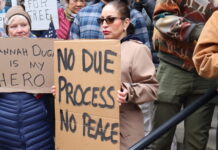
(GA Recorder) — A federal judge will soon decide whether a conservative group is intimidating voters in Georgia by challenging voters’ eligibility in large numbers.
U.S. District Court Judge Steve Jones with the Northern District of Georgia is expected to make a ruling in the coming days after this week’s conclusion of a trial for a lawsuit filed by voting rights group Fair Fight against True the Vote organization that in the aftermath of the 2021 U.S. Senate runoff led the charge to question whether more than 364,000 registered voters were eligible to cast ballots.
Mass voter challenges increased sharply following the 2020 presidential election in which former President Donald Trump’s losses to Democrat Joe Biden included defeats in swing states like Georgia and Michigan.
The case pits the Texas-based True the Vote, founded in 2009 with the stated intention to combat voter fraud against the voter suppression resistance of Fair Fight, founded in 2018 by two-time Georgia gubernatorial Democratic candidate Stacey Abrams.
According to Fair Fight, True the Vote’s extensive voter registration challenges violate the Voting Rights Act of 1965, which prohibits any act that is likely to intimidate voters. Fair Fight alleges that True the Vote targeted metropolitan Atlanta and other communities with large Black and brown voters who historically overwhelmingly vote for Democratic candidates. The plaintiffs accuse True the Vote of offering a $1 million bounty for proof of mass election fraud as an intimidation tactic to keep voters away from the polls.
“The challenges filed in the 2021 runoff were unprecedented and they remain unmatched even as more challenges are filed month after month in counties around Georgia,” Uzoma Nkwonta, a civil rights attorney with the Elias Law Group, said during a late October media briefing. “In fact, as True the Vote has alleged, its challenge effort was the largest in Georgia history, and that is why Fair Fight believes that relief against True the Vote is so critical, especially heading into what we expect will be a contentious 2024 election cycle.”
True the Vote claims it has been backing reasonable disputes about the eligibility of voters based on discrepancies in addresses and other information.
True the Vote’s efforts in Georgia were carried out by the VoterGa organization, which has been at the forefront of challenging fraud.
In a statement on Thursday, VoterGa’s co-founder Garland Favorito questioned the legitimacy of the lawsuit getting this far along. In one extreme instance, VoterGA brought a challenge to 37,500 voters in Gwinnett County in 2022.
“True the Vote does not control voter rolls,” Favorito wrote. “Voter rolls are controlled by the county. Therefore, the lawsuit against True the Vote is invalid—and didn’t have any merit to begin with.”
Last year, Republican Secretary of State Brad Raffensperger requested that state lawmakers re-examine a provision in the 2021 election overhaul law that outlined the ability for people to challenge an unlimited number of voters’ eligibility status.
The provision was part of a 2021 voting overhaul the GOP-led Legislature passed in response to the 2020 election in Georgia. It allowed individuals to file unlimited numbers of challenges to voter’s eligibility to cast ballots, tying up county election administrators’ time and staff and making it more difficult for some people to vote.
Fair Fight plaintiffs are seeking a court ruling that will discourage local county election boards from considering challenges to thousands of voters in bulk. Among the requests is to ban True the Vote from being involved in voter registration challenges in future elections in Georgia.
Among the key witnesses for the plaintiffs was Catherine Engelbrecht, founder of True the Vote, who testified that an incorrect belief that Biden lost in 2020 influenced the organizations that helped facilitate hundreds of thousands of voter challenges in Georgia’s crucial U.S. Senate runoff in January 2021 that gave Democrats control of the federal government.
Brennan Center for Justice, a left-leaning nonprofit, opposes what it calls a preemptive attempt to use unfounded claims of major voting fraud to justify frivolous voter registration status.
An analysis conducted by the Associated Press in December 2021 found that fewer than 500 instances of isolated voting fraud occurred in Georgia and five other battleground states in which Trump disputed the results of the election.
The Brennan Center reported in July 2022 that the voter eligibility challenges in Georgia by that summer resulted in at least 1,800 voters being removed from voter rolls in Chatham, Cobb, DeKalb, Fayette, Forsyth, Fulton, Gwinnett, and Spalding counties.
“These mass challenges are based on unreliable, unverifiable, and incomplete information and they risk disenfranchising eligible Georgia voters,” a Brennan Center report said. “In September 2022, the Brennan Center advised all 159 Georgia counties that these challenges—if permitted to go forward—would likely violate state and federal law and urged them to reject these and similar mass challenges.”







